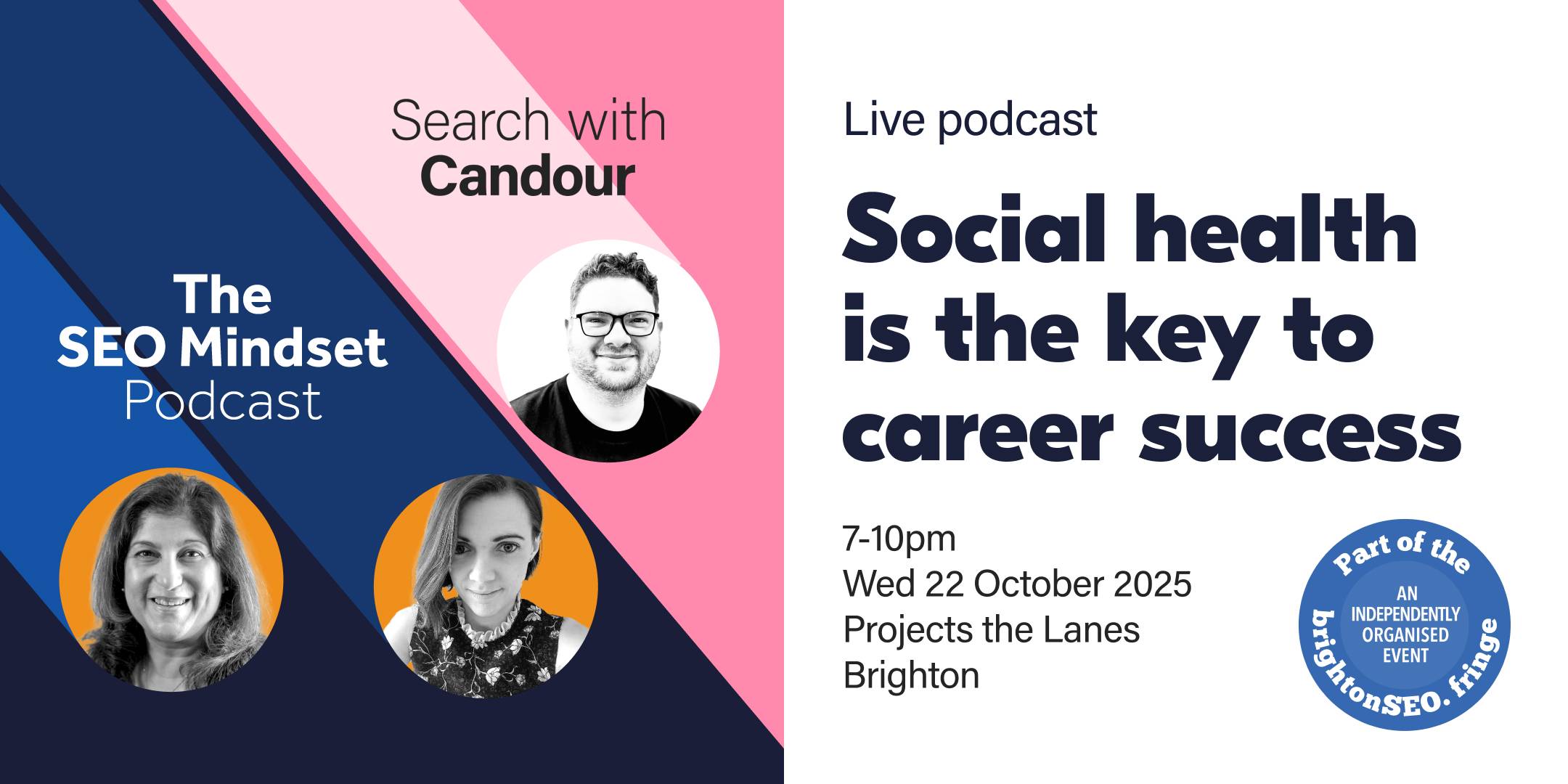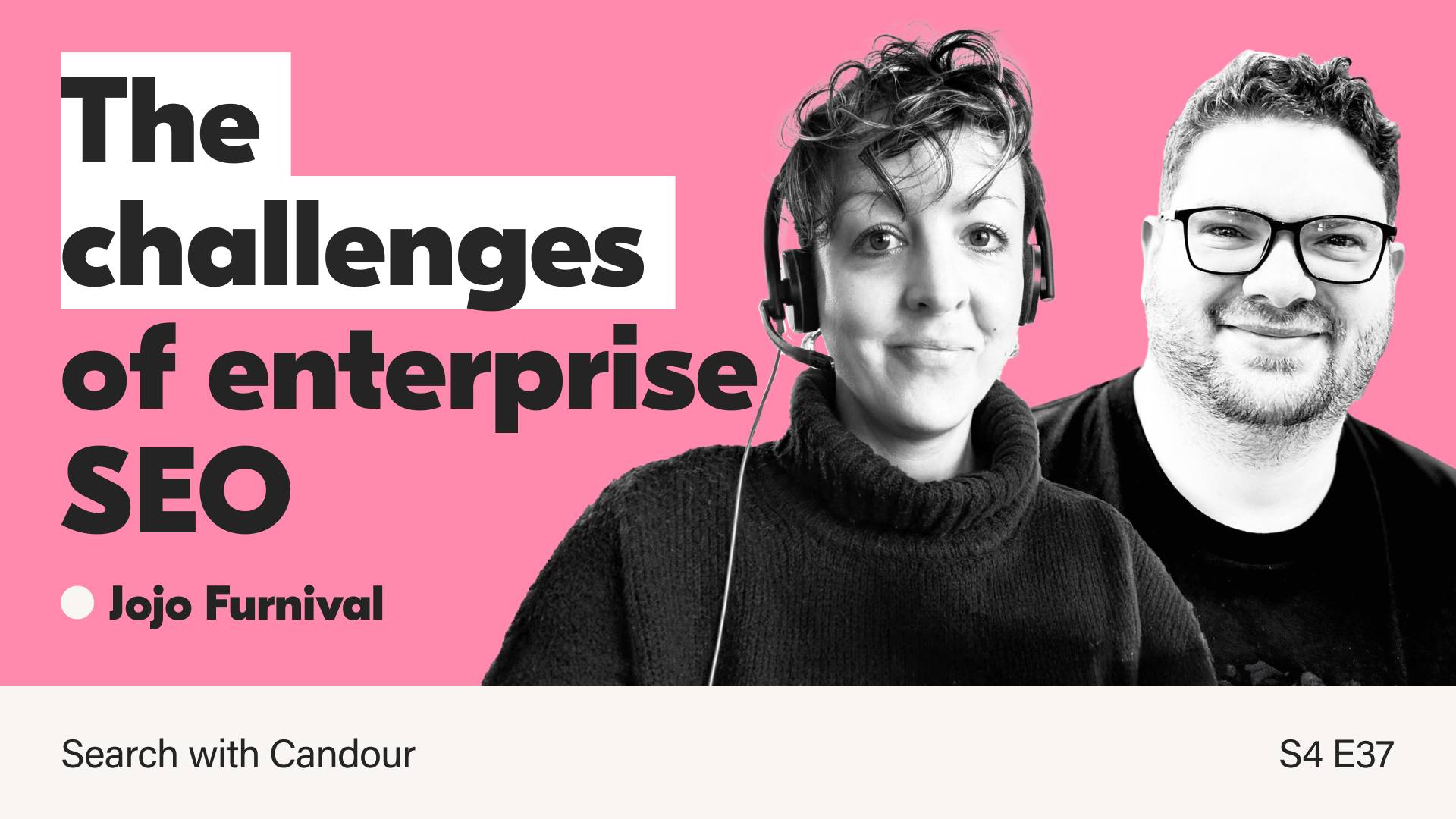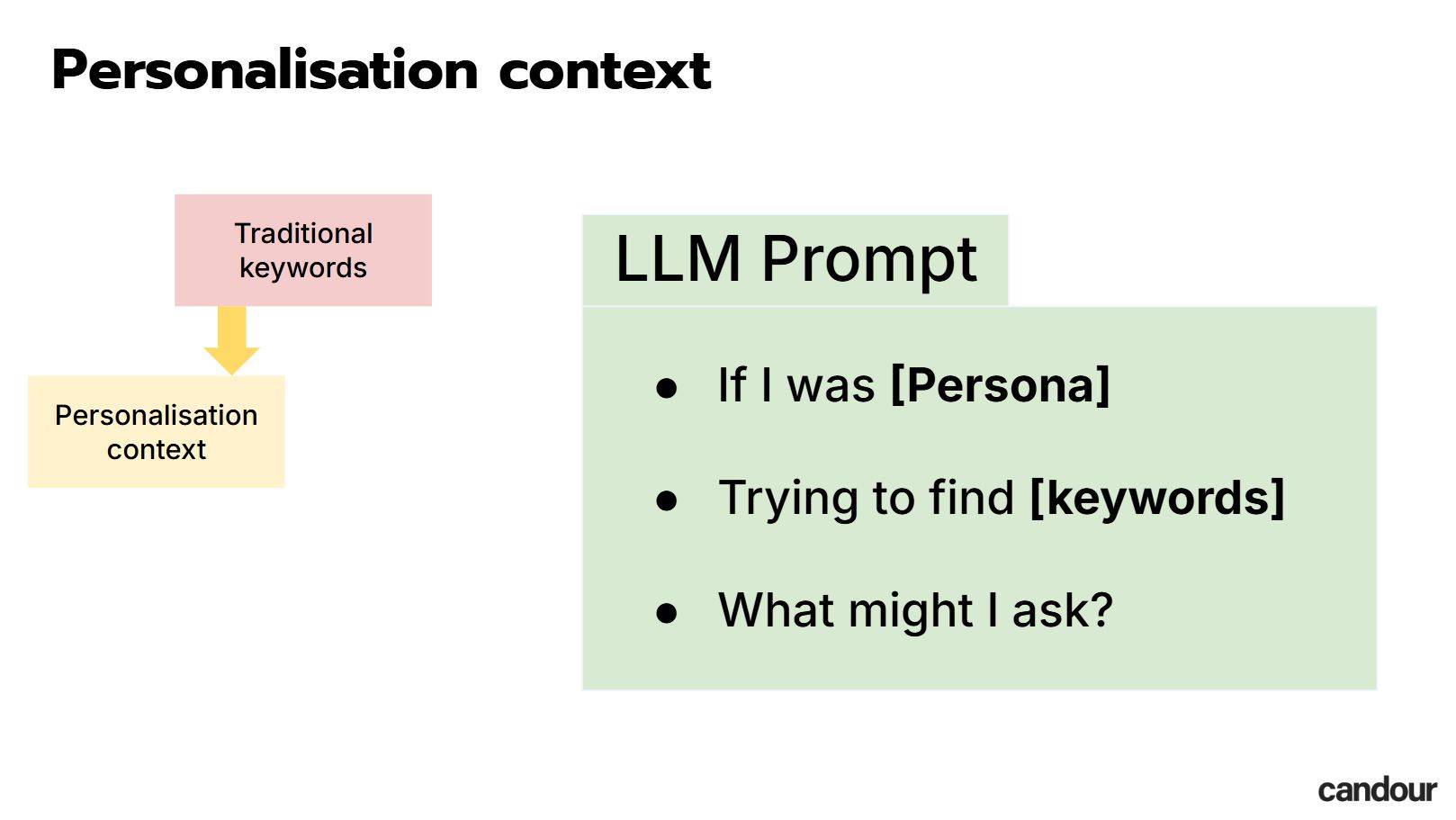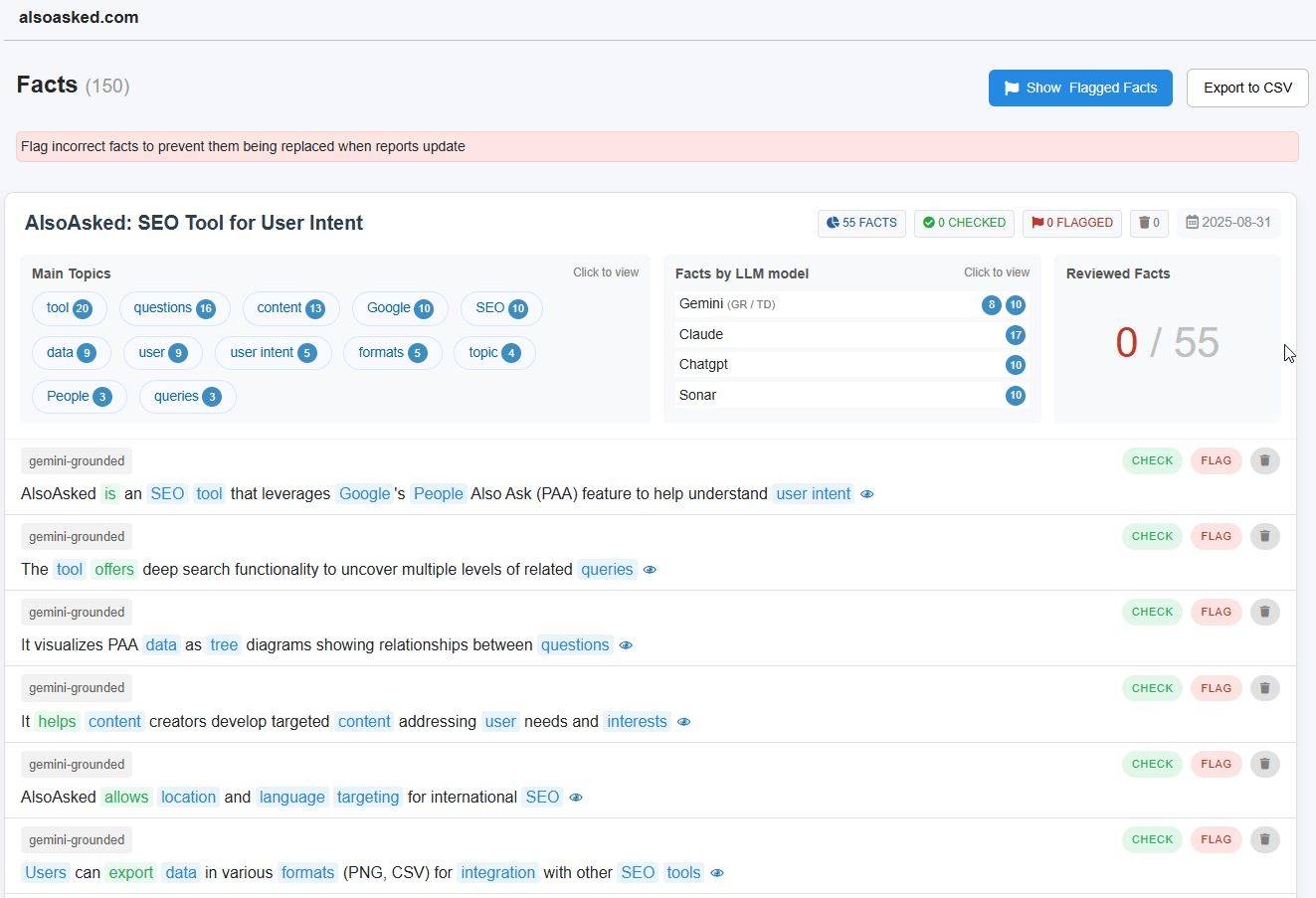|
SEO updates you need to know
Sponsor: Live podcast in Brighton

Search with Candour and the SEO Mindset podcasts are teaming up for another LIVE podcast - the night before brightonSEO in October!
🗣️ Topic: Social health is the key to career success
📆 Date: Wednesday 22nd October 2025
⌚️ Time: 19:00 - 22:00
📍 Location: Projects the Lanes, Brighton
🎟️ Tickets: Free!
Jack, Sarah & Tazmin will be sharing how to build, nurture, and strengthen authentic connections, so you walk away with tools to create a more connected, fulfilling personal and professional life.
|
Search with Candour podcast

The challenges of enterprise SEO
Season 4: Episode 37
In this episode of Search With Candour, Jack Chambers-Ward interviews Jojo Furnival, Marketing Manager at Sitebulb about the unique challenges of enterprise SEO.
Jack & Jojo discuss issues such as the complexity and scale of large websites, resource allocation, and the importance of interdepartmental communication.
Jojo shares insights on the value of automation and proactive management, as well as the essential human skills necessary for effective SEO at an enterprise level.
They also chat about Sitebulb's new cloud services and the importance of aligning SEO strategies with broader business goals.
|
|
|
This week's solicited tips:

Robots.txt won't change the site, I have to become more
Your robots.txt is a band aid fix that covers up architecture that could have likely been designed better 🙊
There are all kinds of disadvantages to using robots.txt to block pages, such as if users browse those pages and link to them, the links won't count.
Got a chance to rebuild a website?
It's a great time to think about it. There is almost always a way it can be built so those never-ending URL spider-traps and annoyances never even get presented search engines.
Don't sow your own technical debt seeds!
|
I'm sorry, I mistook Avg. Position for something else
Avg. Position in Google Search Console is *not* a performance metric, so don't try and use it like that! 🫠
Yesterday, I had someone say "You got that many clicks from Average Position of 26??", but consider this:
All other things being equal, if we had two queries ranking:
🥇 One in #1 and one in #100 = Average position = 50; but we'll potentially get a lot of clicks from the #1 ranking
or
🥈 Two queries both ranking #20 = Average position = 20; but we'll probably get almost no clicks!
There are some uses of Avg. Pos when combined with other metrics, for example:
Scenario 1: You have gained new rankings for queries but they are outside of the top rankings that deliver clicks, will look like:
↔️ Clicks same
⬆️ Impressions up
⬆️ Average position up (clarification: e.g. 26 to 35)
Scenario 2: You have dropped off completely for some higher volume queries that you weren't ranking competitively for, but some of your core rankings have crept up into positions you're getting more clicks (e.g. 5th to 2nd), could look like:
⬆️ Clicks up
⬇️ Impressions down
⬇️ Average position down (clarification: e.g. 35 to 26)
There are precious few reasons to look at Avg. Position on its own!
|

It's not which persona you are underneath, it's what you do that defines your persona
You can make 'traditional' searches useful for AI search by enriching them with persona data. This is what I covered at Digital Olympus conference last week ⤵️
1/ Previous search memory can affect future searches:
🥗 If you tell ChatGPT and your a vegan and ask it for a recipe, and you later ask it for some recommendations on running shoes, it will remember you stated you're a vegan, and show cruelty-free brands, or products that don't have leather.
2/ Questions on AI surfaces tend to be a lot longer:
🗨️ A traditional search engine is like a "one shot" search. It is common for users on AI search to specify several parameters for their search, which LLMs can handle well. You can literally ask ChatGPT, with a persona description, how that user would search for [traditional keywords]. The information in the LLM language graph is *perfect* for this kind of query, as it has all of the highly-specific forum conversations, where users have self-identified this way and asked those questions in natural language.
3/ AI searches are back-and-forth conversations:
🔄 Using AlsoAsked allows you to understand the nearest intent proximity questions. So, when someone asks how much a good pair of running shoes cost, you know they are likely to try and justify that spend because they will ask how much faster expensive shoes will make them run 😂
These are just three of the ways to start approaching AI Search. I will be covering this and more at the Search 'n Stuff conference in Antalya in October. There are fewer than 50 tickets left, so check out the link in comments for a discount code.
If this topic interests you, I highly recommend you follow Dorron Shapow who is building this stuff to the next level 🔥
|

AI thinks your brand is hiding in the shadows
Myriam Jessier really brought into focus for me that understanding how AI systems perceive and describe your brand, products, services, and key attributes is going to be key for the future. ✨
One tool I've discovered that does this really nicely is Dixon's Waikay. One of the first things you can do after entering a URL is pull up a list of perceived "facts" about your brand.
It's a really quick way to diagnose if AI has any misunderstandings, shortcomings or completely absent bits of information; which then can allow you to track down and correct the source. Really impressive stuff.
📝 Disclaimer for the uninitiated: I never take payment to post about things. I know Dixon and he asked me several months ago for early feedback on Waikay, and I have an account I play with. He hasn't asked me to post this. He is cool like that 😎
|
Give a migration to me and I'll do what you should've done 10 minutes ago
A good SEO migration is about reducing ambiguity and sending clear signals to search engines.
A great conversation came up this morning on the Good Signals SEO Office hours, and I wanted to give you the conclusion:
Both feet or nothing.
Generally, it's not a good idea to try and "half do" a migration. i.e. just redirecting part of a site and the rest later, or running a new site in parallel with cross-domain canonicals(!) Sit tight, move everything, and move it definitively.
Make sure the SEO considerations are known, advocate for it. 🦾
|
Refer subscribers and earn rewards!
|
|
|